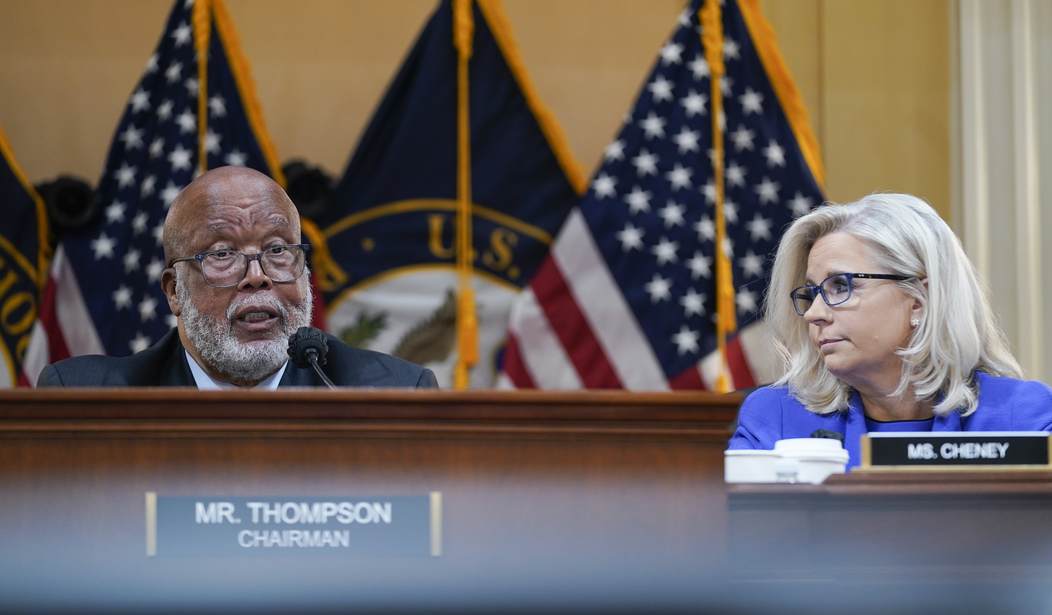An even better question: Are they right?
And a good follow-up question: Did Democrats just spend 16 months proving them correct?
Democrats invested a lot of time, effort, and messaging into the partisan and one-sided House select committee on January 6, at least at first. The committee scheduled a final hearing session for last week in a last-ditch attempt to make the midterms about Donald Trump and the riot. They even voted to subpoena Trump, about as clear a political stunt as one might imagine, considering that they could have done that any time over the previous 16 months the committee was in operation.
What did all of that one-sided presentation and media obsession — especially at the Washington Post — do for the issue of “threats to democracy”? The Post’s Aaron Blake reports that the outcome was surprisingly bad for Democrats:
The New York Times/Siena College poll shows 45 percent of Americans regard Trump as a “major” threat to democracy, while just 28 percent say the same of the GOP.
That 28 percent figure is actually smaller than the percentage who view the Democratic Party as a threat to democracy (33 percent) — despite there being no comparable example of Democrats trying to overturn an election. (And no, Stacey Abrams and Hillary Clinton aren’t analogous.)
First off, yes, they damned well are analogous. Both Abrams and Clinton claimed baselessly that their elections were stolen, and both of them led those claims to be swallowed whole by millions of voters. The only difference — and it’s definitely a significant difference — is that they didn’t lead a demonstration in Washington DC that turned into a riot at the Capitol. However, Abrams spent two years before that riot claiming victimhood over a supposedly stolen election with no proof whatsoever, and Clinton’s team helped gin up the equally baseless Russia-collusion allegations against Trump that seriously compromised the first half of his presidency. In both cases, Democrats fully embraced both stolen-election theories — until November 2020 made that narrative inconvenient.
That set the stage and the precedents for Trump’s stolen-election claims, just as Barbara Boxer’s idiotic Electoral College challenge in 2004 set the stage for the equally idiotic challenge in 2020. Both sides have played this game for short-term political gain at long-term expense, and there is very little difference between either — not after an impeachment driven by House Democrats that largely resulted from swallowing Hillary’s manifestly false oppo-research efforts whole and the desire to seek revenge by any means necessary.
All of this matters if one wants to make sense of the results that Aaron analyzes here. The effort to undermine faith in elections had begun well before the 2020 election and was led by Clinton, Abrams, Adam Schiff, Jerry Nadler, et al.
However, the problem isn’t just partisanship. If this was just a tu quoque situation, the impact of the hearings and committee positions would be a wash. That’s not the case, especially among unaffiliated voters, as Aaron points out:
The poll shows that 71 percent of Trump 2020 voters regard Democrats as a major threat to democracy. But just 52 percent of Biden voters say the same about the GOP.
And independents are significantly more likely to view Democrats as a major threat than Republicans. While more than 6 in 10 view each party as at least a minor threat, just 23 percent view the GOP as a major threat, while 31 percent say the same of Democrats. Independents are actually more likely to view voting by mail as a major threat to democracy (31 percent) than the GOP.
Democrats at least have wised up enough to scuttle their “democracy dies in darkness” strategy, even if the Post hasn’t. Aaron notes that only a tiny percentage of their ads are speaking to this theme, indicating that Democrats realize that it’s a bad argument in this environment. However, he uses an interesting word to frame this point from a Politico piece, and one that is worth tackling, emphasis mine:
Despite the well-publicized Jan. 6 hearings, the last of which was likely held last week, the insurrection has not been an over-arching focus of Democrats’ 2022 campaign messaging. Politico reported last week that Jan. 6 has featured in just 2 percent of ads run for House Democrats.
Are we sure this outcome is “despite” the hearings — or because of them? Democrats rushed at the opportunity to exclude Republicans who opposed their narrative from the committee and broke all sorts of precedents to constitute the most one-sided select committee in House history. The only two members from a party that holds nearly half of the House seats are two hand-picked by Nancy Pelosi for their agreement with Democrats and their cooperation with caucus leadership on the issue.
As a “threat to democracy,” that seems bad enough. However, the urge to put on theatrical hearings without any adversarial responses turned this grubby, partisan effort into a series of “show trial” stunts that completely undermined any remaining credibility the effort might have had. It not only undermined democracy but also due process and any sense of fair play. Democrats turned a legitimate area of inquiry into a transparently politicized process, with the sometimes-explicitly expressed purpose to affect future elections. And they did so by deliberately contradicting precedent and blocking the minority party from providing the proper adversarial balance that might have resulted in at least a more credible approach to this investigation.
And Aaron wonders how Republicans and independents can conclude that Democrats are a greater threat to democracy after seeing how this committee worked? The better question is how Democrat voters can honestly think that their party has handled democracy and elections better over the last six years than Republicans, and especially over the last 16 months.
Aaron’s a smart guy, but he’s blinkered by the Post’s own obsession over this committee. The rest of America apparently has a much healthier view of these matters. This may not be the biggest political backfire of the cycle — there is a lot of competition for that prize, unfortunately — but it definitely belongs in the medal rounds.








